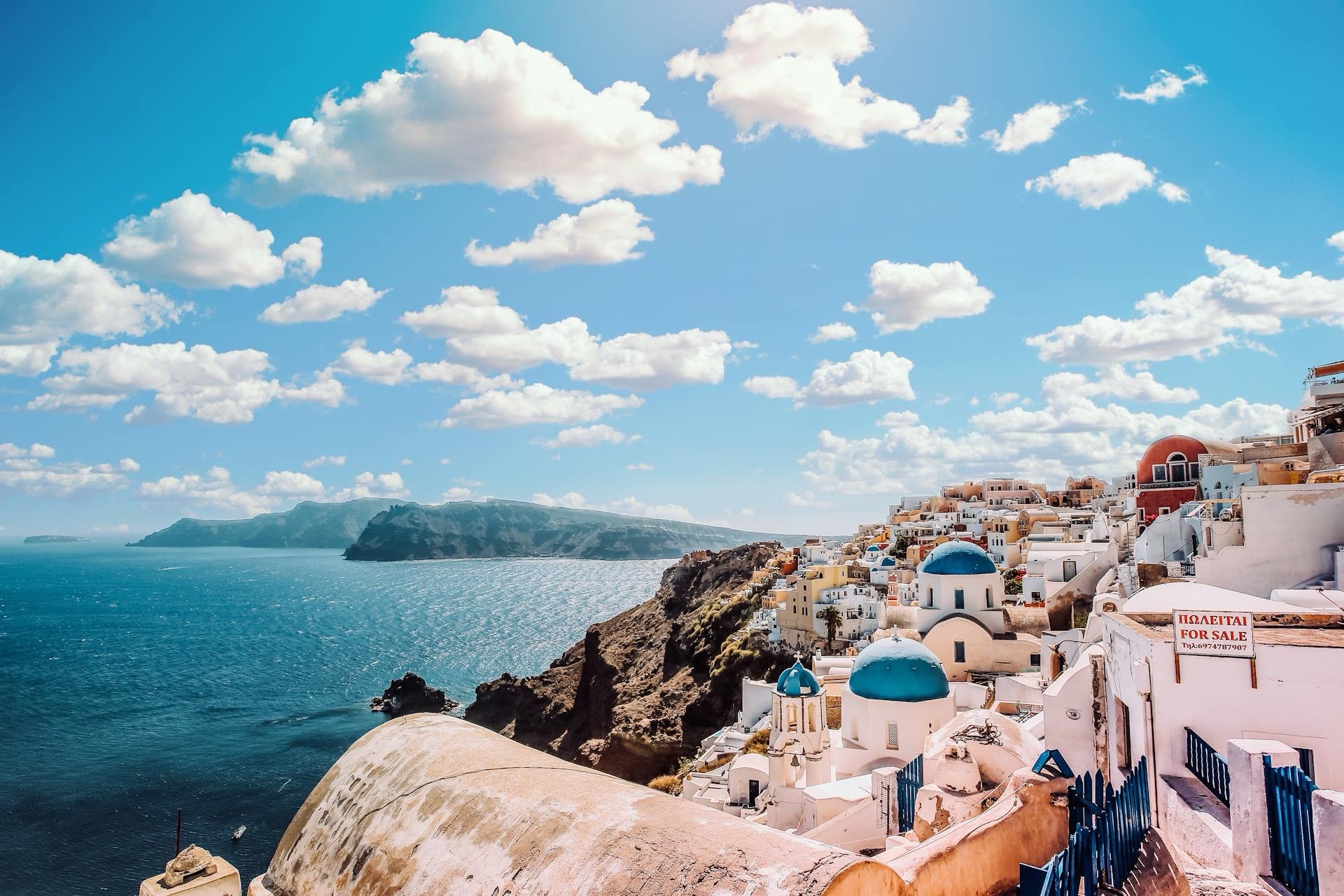Greece is a captivating country, known for its ancient ruins, stunning islands, delicious cuisine, and welcoming hospitality. Whether you’re exploring the Parthenon in Athens, relaxing on the beautiful beaches of Santorini, or wandering through the charming streets of Mykonos, Greece offers something for every traveler. However, before you go, it’s important to understand the country’s customs, culture, and practical tips to make the most of your trip. Here are 16 key things Americans should know before visiting Greece.
1. Greece Has a Rich and Diverse History
Greece is often referred to as the cradle of Western civilization, with its history dating back thousands of years. From the ancient Greeks who built temples like the Parthenon and established democracy, to the Byzantine and Ottoman empires, Greece’s past is deeply intertwined with its present.
When visiting Greece, be sure to explore the many archaeological sites, museums, and historical landmarks that tell the story of its rich past. Whether you’re visiting the Acropolis in Athens, the ruins of Delphi, or the Palace of Knossos in Crete, you’ll be immersed in Greece’s storied history.
2. Greek Hospitality Is Exceptional
Greek people are known for their warmth and philoxenia (hospitality), a tradition that goes back to ancient times. Whether you’re in a city or a small village, locals are often friendly and eager to make visitors feel welcome. It’s not uncommon to be invited into someone’s home or to be offered a small gift, such as a sweet or drink.
Being polite and engaging with locals is a key part of the Greek travel experience. Learn a few basic Greek phrases, such as “Yassas” (Hello) and “Efcharistó” (Thank you), as they will be appreciated by those you meet.
3. Cash Is Preferred
Although credit cards are accepted in most larger hotels, restaurants, and shops in tourist areas, cash is still widely preferred in Greece, especially in smaller towns and on the islands. Many local tavernas, markets, and smaller stores may not accept cards, so it’s a good idea to carry enough Euros for day-to-day purchases.
ATMs are widely available in cities and larger towns, but if you’re traveling to more remote areas or smaller islands, be sure to withdraw enough cash ahead of time, as ATMs may be scarce or unreliable.
4. Public Transportation Is Good, but Plan Ahead
Greece has a decent network of public transportation, especially in Athens and other large cities. The Athens Metro is clean, affordable, and covers most of the major sites in the city. Buses are also widely available in both urban and rural areas, but they can be less predictable, especially on the islands or in more remote regions.
If you’re traveling between the islands, ferries are a common mode of transport. Be sure to book your tickets in advance, especially during the busy summer months. The ferry schedule can change due to weather conditions, so always double-check before heading to the port.
5. Greece Is Safe for Tourists
Greece is generally a very safe country for tourists, with low levels of violent crime. Most visits are trouble-free, but as with any tourist destination, petty theft like pickpocketing can occur in crowded areas, especially in cities like Athens or during busy festivals. Always be mindful of your belongings, particularly in tourist-heavy spots like the Plaka neighborhood or around the Acropolis.
Stay vigilant on public transportation and in crowded areas, keeping your wallet, phone, and passport secure. If you’re driving, keep an eye on your rental car, as petty car theft can also be a concern in some areas.
6. The Siesta Tradition
In Greece, many businesses close in the afternoon for a siesta (nap), especially in smaller towns and rural areas. Typically, shops, offices, and restaurants close between 2:00 PM and 5:00 PM and reopen later in the evening. This is particularly common during the hot summer months when the midday heat makes it difficult to continue working.
If you’re visiting local stores or planning activities, make sure to account for siesta hours. However, larger businesses and restaurants in tourist-heavy areas may remain open throughout the day.
7. Greek Cuisine Is Delicious and Diverse
Greek food is famous for its fresh ingredients, bold flavors, and Mediterranean influences. Traditional dishes like moussaka (a baked dish with eggplant, potatoes, and ground meat), souvlaki (grilled meat skewers), and tzatziki (a yogurt and cucumber dip) are must-tries. Seafood is also abundant, especially on the islands, with freshly caught fish and octopus being staples.
Mealtime in Greece is a leisurely affair, and many meals are shared with friends and family. Don’t be surprised if you end up spending hours at a taverna enjoying a long dinner with multiple courses. Greek meals are meant to be savored, so relax and enjoy the experience.
8. Tipping Is Appreciated, but Modest
In Greece, tipping is appreciated but not obligatory. In restaurants, a 5-10% tip is common, and it’s typical to round up the bill or leave a small amount of change. In more upscale restaurants, tipping closer to 10% is appropriate.
For services like taxis, it’s common to round up the fare or leave a small tip, but it’s not expected. In hotels, tipping porters €1-2 per bag is standard, and for housekeeping, leaving €1-2 per day is appreciated. Tour guides also appreciate tips, especially if they’ve gone above and beyond during your tour.
In general, tipping in Greece is a sign of appreciation, and while not as ingrained as in the U.S., it’s a nice gesture for good service.
9. Dress Modestly When Visiting Churches and Monasteries
Greece is a predominantly Orthodox Christian country, and there are many beautiful churches and monasteries that visitors are welcome to explore. However, it’s important to dress modestly when entering religious sites. Men and women should cover their shoulders, and shorts and short skirts are typically not allowed. Women may be asked to wear long skirts or shawls to cover their legs.
At famous religious sites like the Meteora Monasteries or the Monastery of Saint John on Patmos, dress codes are strictly enforced, so it’s a good idea to carry a scarf or shawl with you if you’re planning to visit.
10. Don’t Flush Toilet Paper
In many parts of Greece, especially on the islands and in older buildings, the plumbing system is not equipped to handle toilet paper being flushed. Instead, most restrooms will have a bin next to the toilet for used paper. This can be a bit surprising for first-time visitors, but it’s a common practice to avoid clogging the pipes.
Always look for signs in the restroom indicating whether you should flush the paper or place it in the bin, and follow local customs to avoid plumbing issues.
11. Expect Late Mealtimes
In Greece, people tend to eat later than in the U.S. Lunch is usually between 1:00 PM and 3:00 PM, and dinner often doesn’t start until around 8:00 PM or later. If you’re used to eating earlier, you may find that many restaurants are empty before 7:00 PM, particularly in less touristy areas.
Greek dinners are long, leisurely affairs that often stretch late into the evening, especially in the summer when the days are longer. Enjoy the relaxed pace and don’t expect fast service—dining in Greece is meant to be savored slowly.
12. Smoking Is Common in Greece
While smoking in public places has been officially banned in Greece since 2010, enforcement of the ban can be inconsistent. It’s common to encounter smoking in cafes, bars, and even some restaurants, especially in outdoor seating areas. If you prefer a smoke-free environment, it’s worth asking whether smoking is allowed before choosing a seat.
In more tourist-heavy areas, non-smoking sections may be more strictly enforced, but be prepared for more casual attitudes toward smoking in many parts of the country.
13. Driving in Greece Can Be Challenging
If you plan to rent a car in Greece, especially on the islands or in rural areas, be prepared for a few challenges. Roads in Greece can be narrow, winding, and poorly marked, especially in mountainous regions. Drivers in Greece tend to be more aggressive, and traffic laws may be less strictly followed than in the U.S. Honking and passing on narrow roads are common, so stay alert and drive defensively.
Parking in cities like Athens and Thessaloniki can be difficult, and streets are often congested. On the islands, driving can be more relaxed, but be mindful of scooters and motorcycles, which often weave through traffic.
14. Island Hopping Requires Planning
Greece’s islands are one of the country’s biggest draws, and island hopping is a popular activity. However, it requires some planning, especially during the summer high season (July and August). Ferries are the primary mode of transport between the islands, and schedules can vary widely depending on the season and weather conditions.
If you’re visiting popular islands like Santorini, Mykonos, or Crete, book your ferry tickets in advance. For more remote islands, there may be fewer ferry connections, so plan your itinerary carefully and be prepared for possible delays or cancellations due to high winds.
15. Respect Local Customs and Traditions
Greece is a country with strong cultural traditions, and it’s important to be respectful of local customs. For example, when visiting someone’s home or certain public spaces, you may be expected to remove your shoes. Greeks are also known for their generosity and hospitality, so if someone offers you a drink or food, it’s polite to accept, even if just a small amount.
During religious holidays like Easter, Greece’s most important holiday, you may encounter local customs, such as midnight church services, processions, or feasts. These are important cultural and religious events, and participating respectfully will be appreciated.
16. Avoid Sensitive Political Conversations
While Greeks are generally open and friendly, politics can be a sensitive topic, especially discussions about the economic crisis or relations with neighboring countries like Turkey. It’s best to avoid engaging in heated political discussions, especially with strangers, as these topics can quickly become contentious.
If politics does come up in conversation, approach the topic with respect and caution, and be mindful of differing perspectives.
Conclusion
Greece is a country steeped in history, culture, and natural beauty, offering travelers a unique and unforgettable experience. From the ancient ruins of Athens to the crystal-clear waters of the Aegean Sea, Greece has something to offer every visitor. By understanding the local customs, embracing the slower pace of life, and respecting the rich traditions of the Greek people, you’ll be able to enjoy a more immersive and rewarding trip. Whether you’re enjoying a leisurely meal at a seaside taverna or exploring the winding streets of a historic village, Greece is a destination that will leave you with lasting memories.




